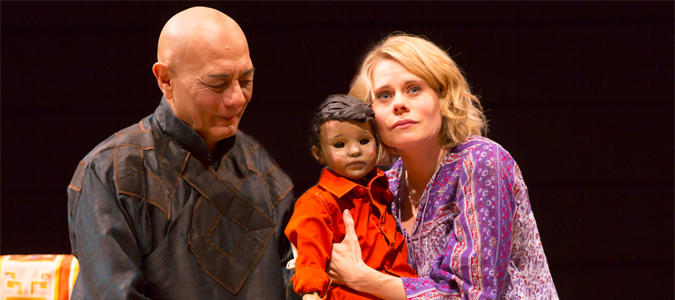

The Oldest Boy
Opening Night: November 3, 2014
Closing: December 28, 2014
Theater: Lincoln Center Theater
In The Oldest Boy, Tenzin, the toddler son of an American woman and a Tibetan man, is recognized as the reincarnation of a high Buddhist teacher. Differing cultures contend with competing ideas of faith and love when two monks seek permission to take Tenzin to a monastery in India to begin his training as a spiritual master. His parents must decide whether to send their young son away or keep him home.
BUY TICKETSREAD THE REVIEWS:
November 3, 2014
One of the spring’s most enjoyable new comedies was Sarah Ruhl’s Stage Kiss, a big wet smooch on the lips to theatrical narcissism. Raucous and ribald, it fit uncertainly in the trajectory of an author better known for the quietly measured teaspoons of drama in works like The Clean House and Dead Man’s Cell Phone and In the Next Room (or The Vibrator Play). Turns out, Stage Kiss was a bit of a blip stylistically. Her new play, The Oldest Boy, at Lincoln Center Theater, finds Ruhl returning to (and thoughtfully extending) her familiar dramaturgy, which involves likable women muddling their way through oddball situations like metaphysical Lucys. Those outré plots are decoys, though: brightly colored attention-getters built to allow her real interests, which are somewhat vaporous and philosophical, to slip by undetected. Which is fine, lovely even, when the plots float. But sometimes a vibrator is only a vibrator. Or, in the case of The Oldest Boy, a lama only a lama.
READ THE REVIEWNovember 3, 2014
It’s hardly uncommon that the emotional tsunami of maternal love can inspire many mothers to believe their children are truly special beings, perhaps even divine. But in the imaginative mind of Sarah Ruhl, that primal connection yields an extraordinary story. The Oldest Boy may not match the poetic complexity of the playwright’s The Clean House, or the socio-psychological acuity of In the Next Room, or The Vibrator Play, but this meditation on such intellectually unfashionable concepts as faith, destiny and spirituality is delicate and affecting. And it’s impossible to imagine it receiving more ideal treatment than in Rebecca Taichman’s exquisite production for Lincoln Center Theater. In the decade since Ruhl emerged as a singular new voice in American theater, she has established herself as a writer adept at weaving together lyricism with naturalism. The MacArthur Fellowship recipient combines existential inquiry with playful humor and unstinting compassion. By that standard, The Oldest Boy is among her more straightforward works, but it has a poignancy that feels unique and entirely personal. It also evinces a fresh perspective on parental attachment and the mentor-disciple relationship.
READ THE REVIEWNovember 3, 2014
“China invaded Tibet in 1949, under the leadership of Mao,” Sarah Ruhl writes in the program note for her newest play, The Oldest Boy, now making its world premiere at Lincoln Center Theater’s Mitzi E. Newhouse Theater. “More than a million Tibetans were killed. 6,256 monasteries were destroyed and looted, fourteen remain intact.” The shocking facts of Chinese brutality in Tibet are undeniable. Curiously, however, Ruhl never mentions what Tibet was like before Chinese occupation, when the vast majority of Tibetans lived as serfs supporting a handful of noble families and a massive Buddhist clergy. The Western propensity to overlook (or even romanticize) Tibet’s feudal theocracy is very much at the heart of Ruhl’s earnest and slightly naive play. Why do we castigate certain oppressive systems while valorizing others? More important: Whose version of the truth is deserving of our faith and trust? The play takes place in an American city with a large Tibetan community (Ruhl never specifies which). Tenzin is a seemingly average American boy, raised by an American mother (Celia Keenan-Bolger) and a Tibetan father (James Yaegashi) living in exile. (Ruhl also never gives these characters specific names.) Tenzin’s mother and father met when she stumbled into his restaurant one day and never wanted to leave, so enchanted was she with the food and the man who cooked it. Against his family’s wishes, they marry and have a son.
READ THE REVIEWNovember 3, 2014
It’s a parent’s worst nightmare — to have a child taken away. Yet the American mom in The Oldest Boy is kind of OK with the situation, once she’s past her initial shock. After all, her 3-year-old, Tenzin, wasn’t abducted by predators but whisked by monks to a Buddhist monastery in India. They asked nicely, too. The monks (Jon Norman Schneider and James Satto) want to raise the child because they believe he’s the reincarnation of a dead lama. “No, not like the animal,” his unnamed mother (Celia Keenan-Bolger) tells her mom. “It means teacher.” The woman’s Tibetan husband (James Yaegashi) doesn’t bat an eye when told of his son’s true nature. It’s harder on her. An American and a lapsed Catholic, she’s studying to become a Buddhist but, still, this is a jump into the deep end of the pool. Playwright Sarah Ruhl has incorporated magical realism in past shows such as Dead Man’s Cell Phone and Eurydice, so it’s not surprising the new one shares that vibe as well.
READ THE REVIEWNovember 3, 2014
The nuclear family and the traditions of Tibetan Buddhism come into conflict in The Oldest Boy, the new play by Sarah Ruhl, about an American child who is identified by monks as the reincarnation of a revered Buddhist teacher. This revelation — if revelation it truly is — poses a painful challenge to the child’s parents, a Tibetan-born father who runs a restaurant in an unnamed American city, and his Cincinnati-born mother. Buddhist practice would require that the boy — just 3 when the play begins — be sent to India to study for his calling at a monastery, a move that naturally dismays his parents, particularly his mother. Ms. Ruhl’s drama, which opened on Monday night at the Mitzi Newhouse Theater at Lincoln Center, is among the most easily accessible from this poetic, venturesome playwright. In addition to being an exploration of a family’s willingness to embrace a radical notion of what may be best for its child, the play offers a neat primer in the history and principles of Tibetan Buddhism. It’s mostly written in a naturalistic style that is far from the regular — which is to say refreshingly irregular — form of Ms. Ruhl, whose previous works include The Clean House and In the Next Room, or the vibrator play (both also produced by Lincoln Center Theater), as well as Eurydice and Stage Kiss. Had I read or seen the play, not knowing its author, I would not have guessed that Ms. Ruhl had written it.
READ THE REVIEW























